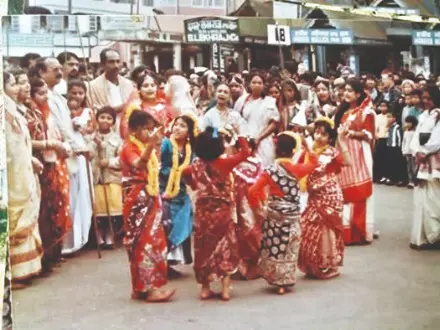Poila Baisakh, a sweet memory for dwindling Bengali population

Darjeeling: Gone are the days of Lobongolotika and Chandropuli, as a dwindling Bengali population struggles to keep its footing in Darjeeling. Poila Baisakh (Bengali New Year) is nothing but a sweet reminiscence for the Bengalis in this Hill town.
Except for a visit to the Mahakal temple, the present day Poila Baisakh has changed its Avatar. “After a hectic week’s work, with both the husband and wife working these days, it is difficult to prepare a Poila Baisakh spread at home. We usually go out to eat. However, I feel sad for my kids, they did not get to see the good old days of Darjeeling Poila Baisakh,” stated Saibal Chakraborty, a Hill resident.
“I miss the Poila Baisakh of yesteryears. Though the Bengalis did not own sweet shops in Darjeeling, the local sweet shops mostly run by the Bihari population used to prepare special sweets like Lobongolotika, Chandropuli and Khirer Shondesh on this day. There used to be a shop called Sri Kshetra Mistanna Bhandar run by a family from Odisha at Judge Bazar. Their Chanar Murki was to die for,” reminisced Nirmalendu Bhattacharya, a resident of the Hilll town.
For many who have moved out of Darjeeling, Poila Baisakh still brings back sweet memories. “People used to arrive at the Mahakal temple as early as 4 am. After a round of puja, we used to have a day long Adda at the Chowrasta, catching people returning back from Mahakal and forcing them to part with their prosad. I still miss Darjeeling Poila Boisakh. The Capitol Movie hall used to screen Bengali movies on the occasion of Poila Baisakh,” stated Shankar Sinha who now resides in Siliguri.
“In the evening, the Nripendra Narayan Bengali Hindu Hall used to stage a cultural programme which would be either a Gitinatya or a drama. Rehearsals used to take place well ahead. Poila Baisakh used to be commemorated in a grand way by the Brahmo Samaj of Darjeeling also,” stated Debasish Ghosh. Owing to the dwindling Bengali population, the cultural programme has been discontinued for years.
“The Poila Baisakh spread used to be sumptuous. Along with the mutton and Basanti Pulao, special fish, including Chingri, Pabda, Chitol and Baata from Katihar used to be brought from Shyamal Da’s fish stall,” stated Sanjit Sinha, who now resides in Kolkata.
If the quantity of fish consumption is by any way considered to be the yardstick of the Bengali population, then it definitely cuts a sorry figure. “I used to sell more than 300 kg of fish on this day even in the 1980’s. Now it’s all a thing of the past,” stated Shyamal Das, the last of his tribe, Bengali fish vendor in Darjeeling.



